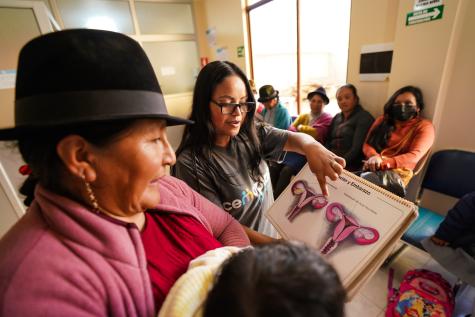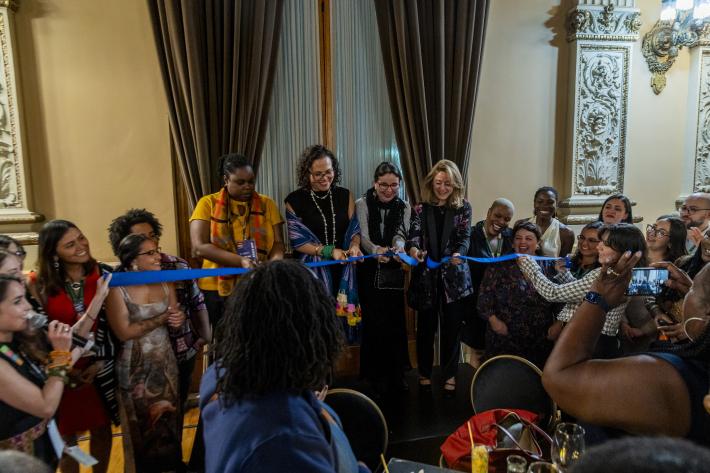
Spotlight
A selection of news from across the Federation

Americas & the Caribbean
Our Statement on the Reinstatement of the Global Gag Rule
The Global Gag Rule (GGR) violates our core principles, and IPPF cannot and will never sign it.
Filter our news by:


| 17 June 2024
Brazilian Congress once again violates the rights of women, girls and people who have abortions
Haz click aquí para leer este posicionamiento en español. Clique aqui para ler essa posição em português. Gestos, IPPF Collaborative Partner in Brazil, expresses its deep indignation at the urgent approval of Bill 1904/2024, which equates legal abortion and homicide if performed after 22 weeks of gestation. For such a bill to pass to the plenary for a vote, without being analysed by the Commissions of the Chamber of Deputies, is a direct attack on the rights of all women, girls and people who have abortions in Brazil. The right to abortion is permitted in Brazil in three cases: risk to the life of the pregnant woman, pregnancy resulting from rape and anencephalic fetuses. This bill, which has the support of the Chamber President, Arthur Lira, represents another serious violation of rights, increasing the conditions of suffering and impotence. It is unjust, ineffective and will cause further damage to the health (including mental) of women, girls and pregnant people. In Brazil, about 60% of rape cases occur against girls up to the age of 14. According to the Unified Health System (SUS), in 2022 there were more than 17,000 pregnancies of girls up to 14 years old, which represents an average of 39 girls giving birth every day. Data indicates that girls take longer to realise the violence they have suffered, most often committed by male family members, and do not immediately identify the pregnancy. Brazil is already considered a country that has failed to guarantee the right to legal abortion. The last Universal Periodic Review (UPR) of Brazil conducted by the UN Human Rights Committee in September 2023 expressed serious concern about the violation of access to legal abortion in the country. Several recommendations made to the country call for the repeal of laws that criminalise people in need of legal abortion and the health professionals who assist them. Civil society organisations, research institutes and the World Health Organisation itself have warned about the seriousness of the reversals in reproductive rights. In 2019, five years ago, Gestos launched the campaign "Legal abortion: don't judge, support", which highlighted the urgent need to offer support and solidarity to people who need abortions in the cases provided for by law. There is no shortage of evidence that abortion is a public health issue and that it must be discussed considering the multiple structural inequalities faced by women, girls and people who have abortions. That is why we reject those representatives who, in the National Congress and/or in the different executive bodies, represent fundamentalism, sexism, misogyny and irresponsibility towards the people they are supposed to protect in their public functions. For this reason, Gestos joins the different demonstrations and activities of feminist organisations, social movements and civil society: we will not stop until Bill 1904/2024 is stopped in Congress. Gestos is a Collaborative Partner of IPPF in Brazil. Since1993 they have effectively contributed to guaranteeing the human rights of people living with HIV and AIDS. They also help to form new civil society organizations, such as the National Network of People Living with HIV/AIDS (RNPVHA - 1995), the Positive Work Group - GTP+ (2000), the Group of Positive Actions (2003), the Group of Support to HIV Positive People (GASP) 2003, Acts of Citizenship (2006). From 2007 to 2011, Gestos created and coordinated the UNGASS-AIDS Forum on Sexual and Reproductive Health, where it oversaw the implementation of agreements signed at the UN in sixteen developing countries. The UNGASS-AIDS Forum has established itself as a space for political debate on issues related to HIV and AIDS and sexual and reproductive health and rights. They are also a consultative NGO at the UN, with ECOSOC status since 2017.

| 17 July 2024
May News Round-Up
Haz click aquí para leer el Resumen de noticias de mayo en español. Brazil | Gestos celebrates 31 years of advocating for SRHR Gestos, IPPF Collaborative Partner in Brazil, celebrated their 31st anniversary with dance, music and much love from their community. Since their founding, they have advocated to link social, cultural, economic and environmental issues to inclusive and effective public policies on sexual and reproductive health and rights. For 31 years, Gestos has effectively contributed to guaranteeing the human rights of people living with HIV and AIDS. Around 70 per cent of the people who have sought legal support from the institution have had their rights repaired, through injunctions and judgements. Gestos' advocacy efforts effectively reach multilateral bodies dedicated to monitoring HIV, gender, sexual rights and public development policies and, since 2001, the organisation has been monitoring United Nations resolutions on these agendas. Congratulations, parceiras! Bolivia | Colectivo Rebeldía celebrates diverse 🏳️🌈 🏳️⚧️ families for IDAHOBIT To commemorate the International Day Against LGBTIphobia, Colectivo Rebeldía, Collaborative Partner in Bolivia, joined the Sexual Diversity Movement of Santa Cruz to celebrate love and diversity on May 17th. They brought the community together to celebrate all forms of love and all forms of families. The cold weather was no obstacle to this warm and welcoming gathering where they shared moments of reflection, art and connection. You can learn more about this joint project with their most recent (and creative!) post. Cuba | Cenesex fights LGBTQI-Phobia with gala, march and community-oriented events IPPF Collaborative Partner in Cuba, Cenesex, went all out for IDAHOBIT celebrations with the Cuban Days Against Homophobia and Transphobia during the month of May. They took the streets to the rhythm of the Cuban Conga against Homophobia and Transphobia, waving the trans and transinclusive pride flag across San José de las Lajas. They also celebrated the graduation of 30 transgender people as Sexual Health and Rights promoters in prisons. Their community work is incredible! Dominica | Dominica Planned Parenthood Association champions gender equality at SIDS4 From May 27-30 the Dominican Planned Parenthood Association participated in the 4th International Conference on Small Island Developing States. This year, Antigua & Barbuda was host to leaders from the 39 independent States and 18 Associate Members of United Nations regional commissions and other world leaders, officials, and experts from the private sector, academia and civil society. DPPA participated in the Gender Equality Forum as part of the SIDS4, bringing forward the importance of addressing gender-based violence. Haïti | The Association of Midwifes of Haiti highlights the important role of midwives at the forefront of crisis. To celebrate the International Day of the Midwife, on May 6th the Association des Sages-Femmes d’Haïti (ASFH) organized the webinar “Midwives in Haïti: Agents of Solution in the Socio-political Crisis”, of particular importance in the country’s current context. Key stakeholders came together to discuss best practices, challenges and solutions to strengthen maternal and child health in the country. It was a relevant virtual platform for reflection, exchange of ideas and collective action. Perú | INPPARES and IPPF ACRO express concern regarding the latest Health Ministry’s decree that violates LGBTQI+ rights. The IPPF Americas and Caribbean Regional Office joined INPPARES, IPPF Member Association in Peru, in expressing its rejection of the Supreme Decree Nº 009-2024-SA issued on May 10th by the Peruvian Ministry of Health which, by updating the Essential Health Insurance Plan (PEAS) based on the 10th revision of the International Classification of Diseases (ICD-10), violates the human rights of LGBTIQ+ people. This decision of the Peruvian government to use ICD-10 is very serious, as it violates binding codes and agreements at local, regional and international level. You can read our joint statement here. If you want to receive SRHR news directly from the ground to your inbox, subscribe to our newsletter Rising the Tide: Subscribe

| 16 May 2024
Floods in Rio Grande do Sul: a look at women and climate change
Clique aqui para ler em português. Click aquí para leer en español. Gestos expresses deep solidarity and concern about the current situation faced by the state of Rio Grande do Sul. We know that climate disasters disproportionately affect populations in situations of social vulnerability and these circumstances demand, more than ever, a watchful eye and firm gestures to guarantee rights. Based on the lessons learned, it is urgent to move towards the implementation of effective public policies that protect people in situations of humanitarian crises as intense as the one experienced these days in the south of the country. Thus, it was with great indignation and concern that we became aware of the cases of sexual abuse of women displaced by the catastrophe in shelters, all of them under 18 years of age. As has been proven and documented in similar situations, what has happened raises the alarm that official complaints represent only a small fraction of the cases of harassment that have occurred. Sexual violence related to climate events has long been documented and its prevention requires immediate attention from local authorities. It is widely known and has been discussed in various international spaces with data showing that humanitarian responses require a gendered approach, requiring protective measures to be put in place. UN data already shows that women are 14 times more likely to die in climate disasters than men. There is no lack of evidence, but once again the attention of the public authorities to the situation of women has been lacking. This is unacceptable and the extreme vulnerability of women and girls to climate change has been highlighted by civil society organisations, including Gestos, and by different UN agencies in multilateral forums. In times of tragedy, solidarity manifests itself, but there are also gaps for multiple violations. Reports from partners living in the state also indicate the neglect of the protection of people's sexual and reproductive rights, as well as episodes of transphobia, the breakdown of secrecy about HIV status and the adoption of segregating and stigmatising strategies during the crisis, such as the forced separation of people affected by tuberculosis in specific places. Concern must go beyond the structural and material reconstruction of the state. It is urgent to allocate resources to develop a contingency plan capable of mitigating the impacts of the crisis on populations - impacts that are not yet measurable. Gestos remains available to contribute in whatever way possible to strengthen this powerful network of support and solidarity. You too can contribute by consulting the list of serious partnerships that have made a difference in the lives of hundreds of people. How to help: Gestos is a Collaborative Partner of IPPF in Brazil. Since1993 they have effectively contributed to guaranteeing the human rights of people living with HIV and AIDS. They also help to form new civil society organizations, such as the National Network of People Living with HIV/AIDS (RNPVHA - 1995), the Positive Work Group - GTP+ (2000), the Group of Positive Actions (2003), the Group of Support to HIV Positive People (GASP) 2003, Acts of Citizenship (2006). From 2007 to 2011, Gestos created and coordinated the UNGASS-AIDS Forum on Sexual and Reproductive Health, where it oversaw the implementation of agreements signed at the UN in sixteen developing countries. The UNGASS-AIDS Forum has established itself as a space for political debate on issues related to HIV and AIDS and sexual and reproductive health and rights. They are also a consultative NGO at the UN, with ECOSOC status since 2017.

| 14 April 2024
March News Round-Up
IPPF ACRO participates in the C20 Conception Meeting in Brazil. Kamilah Morain, Director of Member Association Support and Development at ACRO, participated in the inaugural meeting of the C20 Engagement Group in Recife, Brazil. This group plans and proposes policies for the upcoming G20 forum, which will take place in November 2024, focusing on issues such as health and education. As the co-facilitator of the Women's Rights and Gender Equality working group, she will, on behalf of IPPF ACRO, seek to ensure that the voices of women and girls are heard by the G20 leaders. This is crucial because the G20 represents a large portion of the global economy and trade. Profamilia ready to host the Seventh International Conference on Family Planning in November 2025. For the first time in history, the International Conference on Family Planning (ICFP) will be held in Latin America, and Profamilia Colombia will be a co-host! Alongside the William H. Gates Sr. Institute for Reproductive Health and Population and the Government of Colombia and the Valle del Lili Foundation, Profamilia will welcome thousands of family planning professionals from November 3rd to 6th, 2025, in Colombia. The ICFP serves as a gathering point for governments, institutions, researchers, activists, and professionals seeking to promote collaboration and innovation in sexual and reproductive health. On this occasion, Colombia has been chosen as the venue due to the government's commitment and the efforts of social movements that have resulted in significant advances in access to sexual and reproductive health for Colombian people. See you there! Gestos succeeds in canceling the HIV and other STI testing requirement in the city of Lagoa do Carro, Brazil. Thanks to a complaint from Gestos' legal team, and in collaboration with Caop Cidadania and the Public Ministry of Carpina, the municipal government of Lagoa do Carro canceled the requirement to undergo HIV, Syphilis, and Hepatitis B and C testing in its contests. This significant victory for human rights and the advancement of sexual and reproductive health is a reminder that demanding STI test results is a discriminatory practice that violates human rights. Furthermore, in Brazil, the right to confidentiality is guaranteed by law. Congratulations to the Gestos team for their hard work in guaranteeing the rights of people living with HIV! Kamala Harris visits a Planned Parenthood clinic and becomes the first Vice President of the United States to visit an abortion clinic. The sixth stop on Vice President Kamala Harris's "Fighting for Reproductive Freedom" Tour was a Planned Parenthood abortion clinic. It has been a great opportunity for the Vice President to see the great work that Planned Parenthood does every day to provide sexual and reproductive health care, including safe abortion. In the months leading up to the presidential elections, she has positioned herself as an advocate for access to abortion in a complicated context following the Supreme Court's recent decisions on this issue. "It is right and just that people have access to the health care they need," Kamala Harris said at a press conference. If you want to receive SRHR news directly from the ground to your inbox, subscribe to our newsletter "Rising the Tide". Subscribe

| 04 March 2024
Strains and setbacks: the current challenge of the right to abortion in Brazil
Gestos and IPPF ACRO express their concern about the current position of the Brazilian government regarding guaranteeing the right to abortion, as established by law. We join organizations expressing outrage at the maintenance of guidelines from the previous government, which, in an attack on the rights of people with uteruses, set a limit of 21 weeks and 6 days for legal abortion. We reinforce that there is no gestational time limit for abortion in cases provided by law and that the SUS (Unified Health System) must attend to all individuals in need, without imposing limitations, without any prejudice or discrimination against those seeking the service.
















